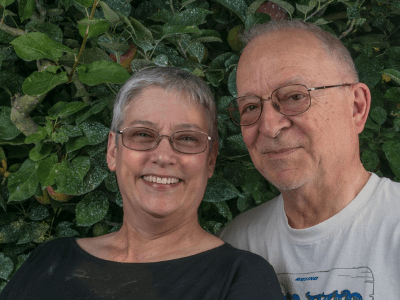
As an aeronautical engineer, lung cancer advocacy was hardly on Janet Freeman-Daily’s radar. Nor, for that matter, was lung cancer. A non-smoker devoid of any known risk factors, her diagnosis came as a complete shock. Those who know Janet, however, were hardly surprised by her deep dive into lung cancer advocacy.
In early 2011, Janet had what she described as a light cough. It lingered for months, and antibiotic treatment did nothing to help. It wasn’t long before the cough became more than irritating: she was coughing up blood and green “gunk.”
Following the recommended curative treatment of combined chemotherapy and radiation, all of her initial tumors shrank, but more began to show up elsewhere in her body. Although she tested negative for both ALK and EGFR biomarkers, Janet was lucky: a few months later, a new biomarker called ROS1 was announced. Testing showed that this was Janet’s biomarker. Having an identified biomarker put Janet in a position to receive personalized treatment targeting ROS1+ cancer cells. No FDA-approved treatment was available for ROS1 tumors.
November of 2012, Janet entered a clinical trial for ROS1. Two months later, she achieved NED (no evidence of disease). As of this writing in March 2021, she remains NED. For better than eight years, a daily pill has kept her disease at bay. And it is all due to research.
Giving Back: An engineer pivots to lung cancer advocacy
As she began to feel better, Janet asked herself how she could give back. And boy, did she figure that one out!
Along with two other patients with the ROS1 mutation, she formed the ROS1ders, a group that is over 500 members strong. They are spearheading incredible lung cancer advocacy work, doing their part to move the needle on much needed funding for further lung cancer research. Advocacy for lung cancer research is vitally important because historically it has been woefully underfunded. In fact, federal funding for lung cancer research per related deaths was $3,116.00 as compared to $15,917.00 allocated for breast cancer research. The discrepancy is outrageous, yet continues.
Janet, who holds engineering degrees from MIT and Caltech, is a writer, science geek, and lung cancer patient/activist. She puts her science background to excellent use by translating the science -and personal experience – of lung cancer treatment and research for the ever growing patient community.
“I’ve made a career as a “technical translator” of sorts. I applied my communications skills and MIT and Caltech engineering degrees to a career in aerospace systems engineering for two decades–interacting with customers, developing new products and writing proposals. I researched a scientific or engineering subject, described it to others in less technical terms, and helped them understand how this new gizmo could benefit them.”
Equal Opportunity Advocate: We are all in this together.
Janet is not only a valued member of LCFA’s Speakers Bureau and Hope With Answers video series, but she also – and this is not a complete list –
- Co-moderates the Lung Cancer Social Media (#LSCM) Chat on Twitter as @JFreemanDaily
- Blogs at grayconnections.net
- Collaborates with researchers
- Speaks at medical conferences with the goal of improving outcomes and quality of life for lung cancer patients
Additionally, Janet shares her influence, expertise, and advocacy skills with
- The National Cancer Institute
- LungSPORE programs at cancer centers
- HICOR (Hutchinson Institute for Cancer Outcomes Research) based out of the Fred Hutchinson Cancer Research Center in Seattle, Washington
A key player in the creation of the STARS (Supportive Training for Advocates on Research & Science), Janet works tirelessly to explain the complicated science behind treatment and building relationships with leading cancer researchers around the country.
“I wasn’t sure how to become an advocate, but I chose something I love and enjoy – science – and shared my knowledge. I try to learn from all the experiences in my life. Having lung cancer and becoming an advocate helped me find my purpose, use my skills and meet wonderful people I would not otherwise have known.”
Making a difference through lung cancer advocacy
Officially retired from her work as an engineer, Janet considers herself fortunate that she is able to use her role as a patient, survivor, and research advocate, to make a difference. And, boy, has she made a difference!
The lung cancer community will always need advocates. Lung cancer advocacy is key to increased awareness and valuable education of patients and their loved ones. Of equal, or perhaps even greater importance, advocacy works toward funding investigators who, in turn, are set up to discover new, lifesaving protocols. Without advocates, much needed funding and resultant research would not be possible.
Janet’s advice to anyone considering advocacy work:
“The research is accelerating, and, while there might not be a treatment today, you could play a role in the next discovery. Find what brings you joy and make that the focus of your advocacy. I personally intend to keep advocating for lung cancer patients until I’m out of treatment options and energy.”
The role of lung cancer advocacy cannot be overstated. It is imperative for the development of new, life-expanding and -saving research. At LCFA, we always welcome people within the lung cancer community to join our efforts.
I’m using my lungs to advocate
As a member of LCFA’s Speakers Bureau, I’m advocating for research and raising awareness through the media, embodying hope and action.
View Speaker Profile
